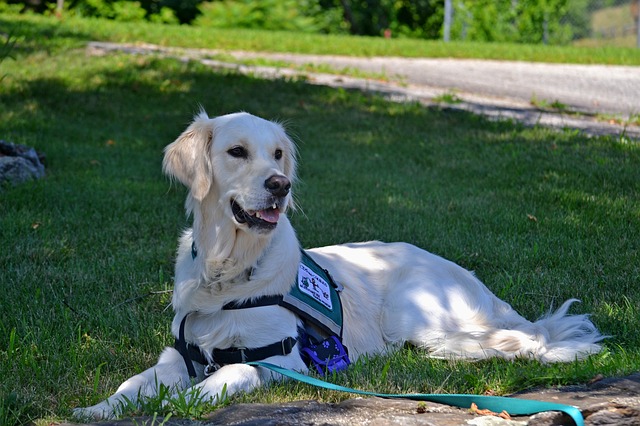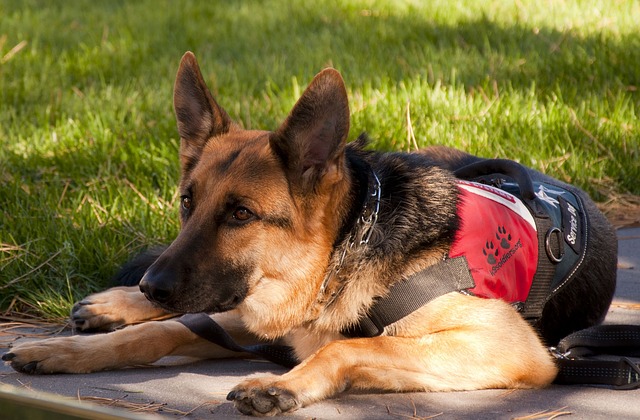At this year’s Association of Professional Dog Trainers (APDT) conference in Hartford, Connecticut, leading dog behaviorist Patricia McConnell, PhD, CAAB and author of the best-selling The Other End of The Leash, gave a talk on dogs and trauma – how dogs are helping people with PTSD and how we can help those heroic dogs.
Since the APDT conference is just for dog trainers, we asked Dr. McConnell some questions about the exciting developments of using dogs as emotional support animals.

I understand there are some new developments on how dogs are helping with PTSD, can you explain what these are?
Although dog lovers have intuitively known that their dogs are good for them, we now know that the presence of a dog can alleviate, and sometimes help to heal, some of the symptoms related to psychological trauma. For example, we know that just petting a dog increases level of the neurohormone oxytocin, which dampens down the activity of sympathetic nervous system. That is the system that puts you on alert, which is often hyperactive in people with PTSD.
What is the dog’s role in this type of service?
Psychiatric Service Dogs can help people with PTSD (and other psychiatric problems) by, for example, increasing one’s sense of safety and security: Dogs can be trained to enter a dark room first and turn on the lights. Fear of entering a dark place is a common problem in people who have been traumatized, and the fear can be so significant that it stops victims from ever leaving the house. Other examples of how dogs help include what is called “Reality affirmation” to help victims manage nightmares and flashbacks, or to intervene in potentially overwhelming situations, by putting a paw on a lap, or poking the owner with his or her nose to interrupt what might be destructive behavior and bring the owner “back to earth.”

Are people beginning to use dogs to treat those suffering from PTSD outside the military?
Yes, although the practice gets less press and attention. But PTSD is not confined to those in the military; one study estimates that 25% of car crash victims develop PTSD. There are many ways an individual can become psychologically traumatized, the most common being rape, violent attacks or suffering through an extreme event like an earthquake or tsunami.
Are these types of serviced dogs protected under ADA law?
Yes, both Psychiatrics Service dogs and Emotional Support dogs who are certified by appropriate agencies are protected under ADA. However, the dogs are only covered if the owner/patient has been evaluated by a medical professional and deemed in need of a dog for their daily functioning or long-term recovery.
Emotional Support Dogs are not trained to perform a particular service (like turning on the lights), but can be vital to those suffering from social anxiety, for example.
What should people know about PTSD dogs, their work, and their rights?
If you see a dog who is clearly identified as a service dog, be respectful of the dog and the owner. Always ask if it is appropriate to interact with the dog (although it probably is best just to resist the urge altogether!) before getting too close.
Don’t be one of those people who see a dog and an apparently healthy person and assume the dog is either a fake, or ask the owner “What is wrong with you that you need a dog?” Would you to tell someone you’d never met about a trauma that you are still trying to heal from?

How can those of that are not in need of a service dog, help these dogs help others?
There are a vast number of organizations now that provide service dogs to those suffering from PTSD. From what I’ve seen, they run the gamut from “border-line fly by night” to “best ever.” The one I’m most familiar with is Freedom Service Dogs in Englewood, CO. They do a fantastic job picking the right dog, training it well, and matching it with the right person.
These are critical steps:
- Everyone suffering from PTSD does not profit from having a dog
- Every dog is not appropriate as a working service dog as well. (I’d argue most dogs might be great family dogs, but not good candidates for this work.)
It is so very important that the organization screens the potential new owners, screens the dogs, trains the dogs well and stands by the pair once they are matched together. When it works, it is a beautiful, beautiful thing!
How you Can Help
Wanting to help provide a dog to someone in need? Many of these organizations accept donations to help support the costs of raising and/or training these dogs. Groups like Freedom Service Dogs provides the client with a dog at no charge, so your donation directly helps someone receive a much needed support dog.
Even if a dog isn’t a trained support animal, just the presence of a pet can help improve mental health and even help those recovering from substance abuse. Learn more at TheRecoveryVillage.com.
